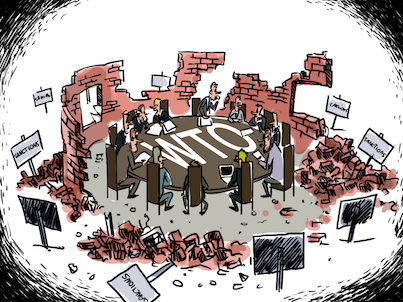The World Trade Organization said that most U.S. subsidies for Boeing Co. comply with international trade rules in a mixed ruling that also ordered Washington State to end a $325 million tax program for the Chicago-based plane maker.
The WTO urged the U.S. to bring its remaining WTO-inconsistent measures “into conformity with its obligations,” according to the text of the ruling.

But the Geneva-based trade body didn’t completely vindicate the U.S. and the panel confirmed that Washington State failed to withdraw certain preferential tax cuts that disadvantaged Boeing’s European rival, Airbus SE.
The WTO appellate body also reversed several of the previous panel’s findings regarding U.S. subsidies to Boeing but it said it was unable to determine if many of those programs had actually harmed Airbus sales.
Both the U.S. and EU praised the ruling as a major win for their respective aerospace industries in separate statements.
Unlawful Subsidies
“The WTO has now rejected every allegation of unlawful subsidies to Boeing with the single exception of one measure—a Washington State business and occupancy tax rate,” Boeing said in a press release.
The Washington State tax measure—which had a total value of $325 million between 2013 and 2015—represents a fraction of the $10.4 billion worth of illegal subsidies that the EU alleged the U.S. conferred to Boeing over a six-year period.
“This is a clear victory for the EU and Airbus,” said Airbus General Council John Harrison. “In the absence of a constructive approach, the EU now has a very strong legal case to move forward to countermeasures.”
Boeing shares traded little changed at $374.21 as of 12:33 p.m. in New York, while shares of Airbus were up 0.5 percent to 116 euros.
The news comes as Boeing struggles to address safety concerns with its 737 Max jetliner following two deadly crashes in five months. The plane maker plans to submit software changes to the Federal Aviation Administration for approval.
The ruling marks the latest chapter in a decades-long dispute between the EU and the U.S., two traditional allies whose Transatlantic relationship has frayed after U.S. President Donald Trump imposed tariffs on the imports of steel and aluminum and withdrew from the Iran nuclear treaty.











